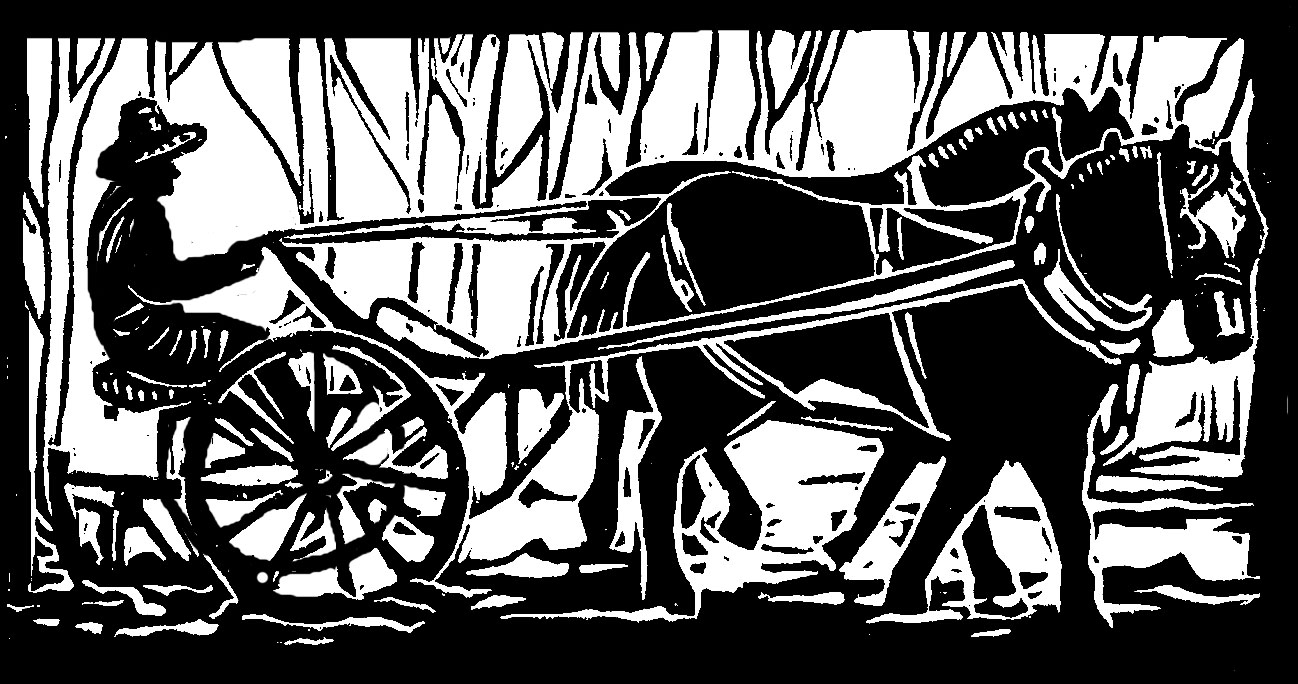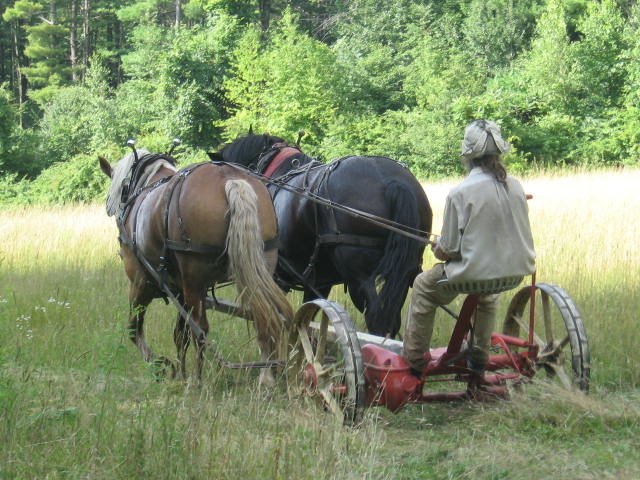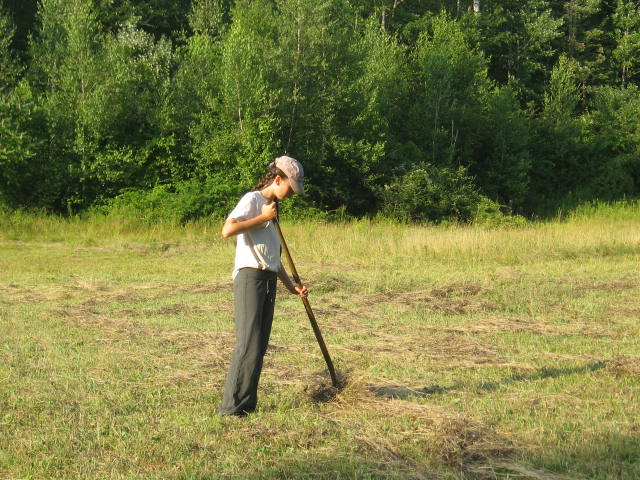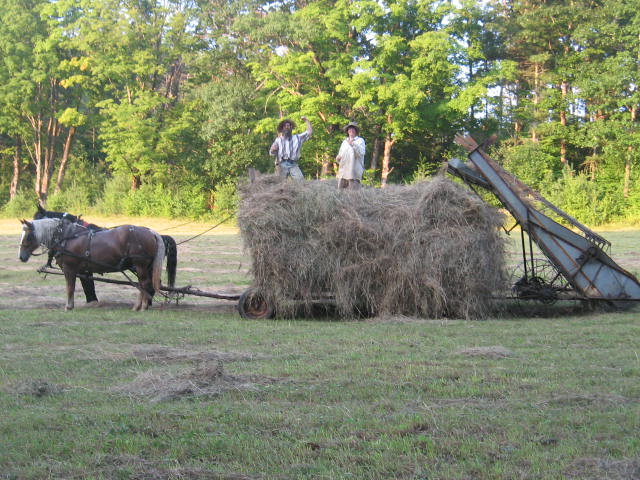FAQ
Is your produce organic?
We follow all organic and biodynamic farming practices, though we are not certified. As members of the Northeast Organic Farming Association of New Hampshire, the Biodynamic Farming and Gardening Association, and the Cornucopia Institute, we keep current with research, regulations, and recommendations. The ongoing relationship between farmers, CSA members, and the farmland allows us all to understand what's happening on the farm without a third-party certification process. Our farming is "transparent" - i.e., members have the opportunity to observe, ask questions, and even pitch in!
Do the horses really work on the farm?
Yes! We have no tractor, but we do have three draft horses: Belgian Molly, and Belgian/Percheron crosses Willow and Fern. The horses plow, disc, harrow, spread compost, make beds, and cultivate the garden. They also provide valuable manure for composting. We put up loose hay from our fields with the horses every summer, and in winter they help gather firewood.
Is the farm produce available only through the CSA shares?
Our produce is also available at the Keene Farmers' Market on Saturday mornings throughout the season. Please see the Keene Farmers’ Market for information on the Market’s regular hours and locations.
Where and when do I pick up my share?
All pick-ups are at the farm in Westmoreland, or at a Keene drop-off site. Members choose either a Tuesday or Friday pick-up day. Vegetables are ready for pick up on the farm anytime between 2:00 and 7:00 p.m. on those days. (We do have lights in our vegetable distribution shed on the farm so that members are able to come after dark if necessary.)
Keene pick-up site hours are in the evening (5:00-9:00 p.m.) on Tuesdays on Beech Street. Saturday morning pick-ups, between nine and noon, are available at our Keene Farmers’ Market stand on Gilbo Avenue in Keene. Keene pick-up members are welcome to come to the farm on Tuesdays or Fridays from 2 to 7 p.m to take advantage of you-pick crops. We will let all members know via email when you-pick crops are available.
What if I can’t pick up my share?
Members in the Keene, Brattleboro, and other local communities help each other each week with pick-up. We can put you in touch with someone in your area who may be able to assist you. If we are notified by phone by the night before the distribution day (at the very latest!), we are happy to switch your pick-up to another harvest day.
What if I’m away on vacation?
There are two options. Members may switch pick-up days within the week (from Tuesday to Friday, for example), or double up shares in another week. We have a vacation calendar in the vegetable distribution shed, and members can easily switch pick-up days by noting it on the calendar. Sometimes members choose to forego their shares for the week, and we divide the harvest among the rest of the garden community.
What if I want to split a share with someone else?
It is tempting to try to save money by splitting a share. Unfortunately, this is not compatible with our distribution system, as it greatly increases the demand for free-choice and you-pick crops. After several conversations with our CSA Core Group (a volunteer advisory board made up of current CSA members), we have concluded that we must ask that members do not split shares.
What if I can’t afford the membership?
If you can’t make full payment in the pledge period, you can choose from two other payment options to help spread out the cost: half-payment during the pledge period and half-payment by September 1st, or ten equal payments over the year. We also make individual arrangements when appropriate.
To help make CSA membership available to a broader range of people, we have established a CSA Share Scholarship Fund. This fund gives members the opportunity to respond to economic disparities, and further strengthens our sense of community.
We also offer CSA shares through EBT- SNAP (Supplemental Nutrition Assistance Program) and the Granite State Market Match.
Beginning in 2019, we have a new CSA share program available for limited income members, thanks to a joint project of Farmers Helping Farmers, the local CSA Farmer group, and the Cheshire County Conservation District. Here's more info from the CCCD's website at https://www.cheshireconservation.org/farmshare
How much produce does each member receive?
Eating and home-cooking habits vary widely from household to household. We estimate that Full shares feed 2-4 adults. Full shares are picked up once every week. Half shares are suitable for one or two people. Half shares are picked up once every other week
What can I expect from you-pick crops?
Our CSA shares are intended as fresh eating shares, rather than canning, freezing, and drying shares. Typically, beans and flowers are plentiful enough for people to pick as much as they would like.
I’ve never seen a kohlrabi before. What do I do with it?
Each new member has access to a downloadable seasonal eating cookbook, which is a compilation of recipes from CSA gardens in the local area. In addition, periodic newsletters provide farm news and storage tips for the produce.
Are there opportunities to work on the farm?
Members are welcome to visit or volunteer in the garden. We host “Ice Cream (and Weeding) Parties,” which are a wonderful opportunity to get to know the farm and one another, as well as to enjoy hand-cranked ice cream! Members also make individual arrangements to help weed or transplant. We always have plenty of weeds for everyone!
Do you offer other local products?
Yes! Over the years, depending on member interest, we have offered for sale to CSA members several locally and sustainably grown or produced items: maple syrup, artisanal cheese, organic sweet corn, organic milk and yogurt, and organic sweet potatoes. Currently, we have honey for sale, made by the very honeybees who live in our field! Our thanks to Hills Honey, a small business nearby in Westmoreland, which uses only organic beekeeping practices, for tending bees here. We are grateful for the honey, the pollination of our vegetables and flowers, and the life-giving presence of the bees.
What’s in the future for Hillside Springs Farm?
We are envisioning the long-term sustainability of the farm and local agriculture by researching land trusts and the like. We are also experimenting with various seed-saving projects, trialing new varieties in the garden, and investigating the feasibility of a wood-pellet burning stove (versus the current propane heater) in our heated greenhouse, as well as looking into solar panels for the farm.



